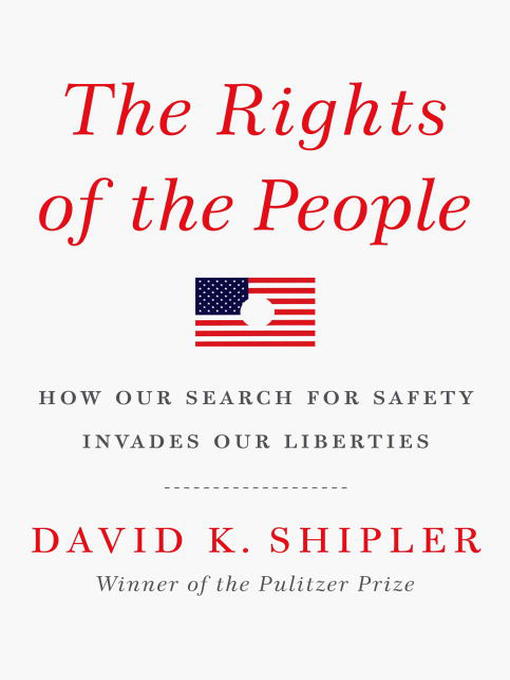
The Rights of the People
کتاب های مرتبط
- اطلاعات
- نقد و بررسی
- دیدگاه کاربران
نقد و بررسی

February 7, 2011
The wars on crime and terrorism have turned into a war on privacy and freedom, according to this provocative but sometimes overwrought exposé of infringements of the Bill of Rights. In this first of two volumes, Pulitzer-winning journalist Shipler (Arab and Jew) focuses on the Fourth Amendment's guarantees against unreasonable search and seizure, and finds violations that remind him of his days covering the Soviet Union. Most shocking is his ride-along reportage on the Washington, D.C., Police Department's bullying searches for guns and drugs in black neighborhoods. (Random stop-and-frisks and automobile searches are so ubiquitous, he observes, that African-American men automatically raise their shirts to expose their waistbands when cops approach; residents are puzzled when he tells them they have the right to refuse police searches.) When the author turns to less intrusive surveillance, like the Bush administration's warrantless wire-tapping, his outrage—"government snooping destroys the inherent poetry of privacy"—is less compelling; he writes as if search engines sifting e-mails are tantamount to Hessians kicking in doors.

March 1, 2011
As the country wages simultaneous "wars" against drugs and terrorism, a former New York Times reporter and Pulitzer Prize–winning author warns against trading our freedoms for the illusion of security.
Identifying five periods in American history when the Bill of Rights has been under particular assault, Shipler (The Working Poor: Invisible in America, 2004, etc.) argues that we are in the middle of a sixth, a post-9/11 era in which our liberties are once again endangered. After promising a second volume about the erosion of the Bill's other guarantees, he focuses here on the Fourth Amendment, "The right of the people to be secure in their persons, houses, papers, and effects, against unreasonable searches and seizures," and its accompanying proscription against the issuance of warrants without probable cause. As he traces the legal, physical boundaries between the individual and the state, Shipler considers a number of scenarios that arise under the Amendment: the stop-and-frisk of a pedestrian, the search of a car or home and the articles within, whether hidden or in plain view; law-enforcement strategies like safety checkpoints and sting operations, the use of wiretapping and data mining; the shortcuts taken by cops that not infrequently includes their "testilying"; the indifference of judges and juries to perjury; prosecutors who suppress exculpatory evidence and who too often rely on junk forensics to secure convictions; the increasing "privatization" of searches, where privately held data gets handed over to the government; and the whittling away of the exclusionary rule. Shipler's sure grasp of frequently impenetrable Supreme Court opinions (translated nicely for the non-lawyer), his engaged reporting and his generally evenhanded assessment of the reasons for these sometimes abrupt, but mostly incremental intrusions on our freedoms make for an informed, persuasive argument.
A timely call for vigilance, for insisting on the protections the Framers provided against an always overreaching government.
(COPYRIGHT (2011) KIRKUS REVIEWS/NIELSEN BUSINESS MEDIA, INC. ALL RIGHTS RESERVED.)

November 1, 2010
Author of best sellers like The Working Poor and the Pulitzer Prize winner Arab and Jew, former New York Times journalist Shipler should effectively address a pressing issue of our time: the escalating violation of civil liberties in the last decade. Important and one of the nonfiction titles I most want to see; with a seven-city tour.
Copyright 2010 Library Journal, LLC Used with permission.

Starred review from March 15, 2011
Shipler began worrying deeply about threats to civil liberties after 9/11, becoming concerned about government impulses in the impending war on terror and the longtime erosion of rights in the war on drugs. The former New York Times reporter talked to lawyers, legal scholars, police, government officials, and citizens to make an insightful analysis of the erosion of basic civil liberties within the past decade. He focuses on free speech, privacy, and protection from unreasonable searches and seizures, rights that have been eroded under the Patriot Act. He traces the bumpy legal history of civil liberties, which have occasionally been suspended during wartime and are threatened by government aims to protect against terrorism. He draws on court cases and his own experiences riding on patrol with police and witnessing firsthand how they negotiate between their suspicions and citizens rights against unreasonable search and seizure. He details cases of nonsuspect suspects, caught in a web of counterterrorism investigations and the myriad ways the government is now conducting wiretaps and drug raids and monitoring phone calls, e-mails, and library usage. Shipler, author of Russia (1983) and Arab and Jew (1986), draws parallels to his coverage of Soviet Russia, in which he found citizens were under such constant surveillance that it eroded their expectations of privacy. A sobering look at the rights Americans take for granted. HIGH-DEMAND BACKSTORY: David K. Shipler, a Pulitzer Prize winner and best-selling author of The Working Poor (2004), tackles another hot-button issue with this incisive look at the erosion of civil liberties in the U.S.(Reprinted with permission of Booklist, copyright 2011, American Library Association.)

























دیدگاه کاربران